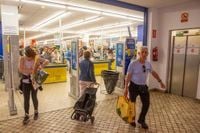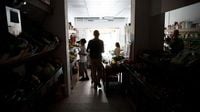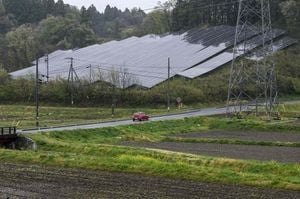On April 28, 2025, a massive blackout swept across Spain, Portugal, and parts of Europe, plunging millions into darkness and chaos. The power failure, which began at 12:33 PM, left hospitals, traffic lights, and homes without electricity for hours, causing widespread panic and disruption.
Images from Spanish supermarkets on the day of the blackout echoed the scenes witnessed during the early days of the coronavirus pandemic. Shoppers rushed to stores, fearing shortages of essential items. Many supermarkets were forced to close due to the lack of power or products to sell, while others, like Mercadona, managed to stay open using generators. This decision proved crucial as it allowed them to serve customers even when the lights went out.
A TikTok user named Iban García shared his experience of shopping after the blackout, expressing disbelief at the chaos he encountered. In his video, he noted that the water shelves were nearly empty and remarked, "I’m shocked at what’s happening in the supermarkets with this blackout." He humorously pointed out the dramatic reactions of shoppers, saying, "How dramatic can people be?"
By the following morning, supermarket groups reported a recovery in operations. The association of food distribution, Asedas, confirmed that almost all stores opened on time and with normality on April 29. Mercadona, which boasts around 1,600 locations across Spain, was particularly noted for maintaining operations during the blackout, thanks to its backup generators.
However, the aftermath of the blackout left many supermarkets in a precarious position. Some stores, like El Corte Inglés and Carrefour, managed to keep their doors open but operated under minimal lighting, which deterred customers. Carrefour's hypermarkets maintained service until closing, while its Express and Market locations experienced temporary shutdowns.
Despite the restoration of power, the fear of a repeat blackout prompted many consumers to continue stocking up on supplies. Reports indicated that canned goods were among the first items to vanish from shelves, with one shopper stating, "There was hardly any tuna left, and there was no bread to be found. People were acting like it was the end of the world."
As the day progressed, some supermarkets began offering free food that could not be preserved due to the power outage. Alcampo organized an impromptu market at its entrances, distributing items like bread and bottled water. Eroski also handed out freshly baked bread to customers, while Dia and Carrefour participated in the initiative by giving away perishable items.
The blackout not only affected food supplies but also raised concerns about food safety. With many refrigerators left without power for over ten hours, experts warned that meat, fish, and other perishable items should be discarded if they had reached unsafe temperatures. Food safety expert Gemma del Caño explained, "If food is above 10 or 12 degrees Celsius, it’s better to throw it away."
On social media, reactions to the shopping frenzy varied. While many expressed frustration at the panic buying, others criticized the behavior of those hoarding supplies. One commenter noted, "They act like they’re in a war," highlighting the extreme measures some took during this crisis.
As families assessed the state of their food supplies, many were left wondering what to do with the items in their refrigerators. One woman recounted how she had just done her monthly shopping before the blackout and was now faced with the possibility of losing all her groceries. "We tried to keep the fridge closed as much as possible, but we were worried about how long the power would be out," she said.
Throughout the country, the blackout underscored the fragility of modern infrastructure. Many people found themselves without water, especially in higher buildings where pumps require electricity to function. Mario, a resident of a twelfth-floor apartment, described his panic when he realized he had no water. "I thought there would be no water anywhere in Madrid, so I started filling every bottle I could find," he said.
As the situation stabilized, supermarket chains began to evaluate the impact of the blackout. The food industry association, FIAB, noted that while some companies experienced production halts, the sector was gradually returning to normal operations. "We are ensuring the quality and safety of all products," a spokesperson stated.
With the power restored to 99.95% of the peninsula by the morning of April 29, many in Spain began to breathe a sigh of relief. Yet, the events of the previous day had left a lasting impression, prompting individuals to prepare for potential future outages. Some families began assembling emergency kits, stocking up on non-perishable foods and water, just in case.
In the aftermath, the resilience of supermarkets like Mercadona, which managed to keep their operations running, contrasted sharply with those that struggled. As the dust settled, it became clear that the blackout had not only tested the systems in place but also revealed the lengths to which people would go to secure their basic needs in times of crisis.
While the immediate threat of the blackout had passed, the experience served as a stark reminder of the vulnerabilities in daily life, leaving many to ponder how prepared they truly are for the unexpected.






